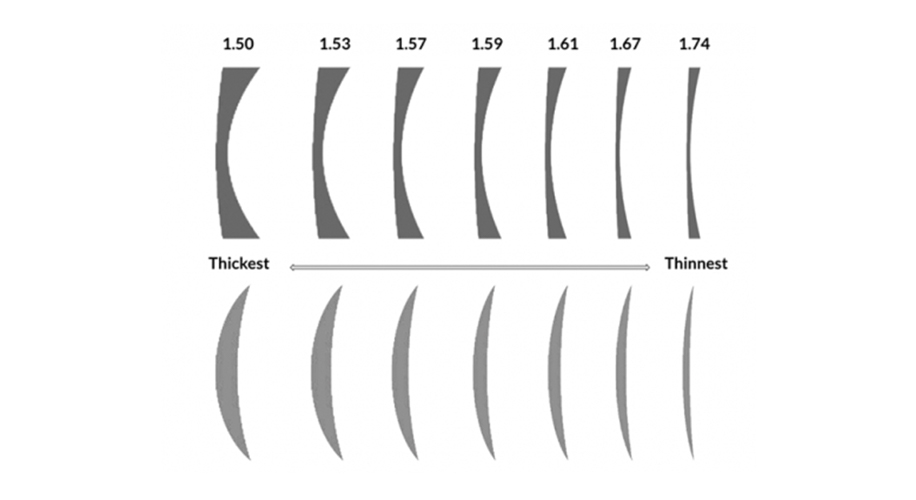Thinnest Lenses for Your Prescription: A Complete Guide
- BY Steven Lee
- IN Billboard

When purchasing new prescription glasses, it’s natural to want the thinnest lenses possible. If you have a medium or strong prescription, your lenses must meet your specific needs. However, we understand that the technicalities can be overwhelming. We’re here to simplify the lens selection process and help you find the perfect lenses for your frames.
What Influences Lens Thickness?
When you’re in the market for new glasses, three main factors significantly impact the thickness of your lenses:
1. Prescription: Your prescription is the primary determinant of lens thickness. In simple terms, the stronger your prescription, the thicker your lenses will be. This is particularly noticeable for prescriptions that include moderate to high astigmatism correction.
2. Lens Material or Lens Index: The lens index, which measures how much the lens bends incoming light, plays a vital role in determining lens thickness. A higher index means thinner lenses. For example, a 1.61 lens is thinner than a 1.50 lens.
When you’re shopping with us at Zenni, selecting a higher lens index during checkout is the most straightforward way to ensure you get thinner lenses. Rest assured, the recommended lens index for your prescription will be your best choice.
3. Lens Size: The overall width and height of your lenses can significantly impact their thickness. Bigger lenses tend to be thicker. When choosing frames at Zenni, lens dimensions are predetermined based on your frame selection. Beyond considering style and face shape, sizing is essential, as is considering any advice from your eye doctor.

Lens Index Options
Now that you understand the factors affecting lens thickness, let’s explore the lens index options at Zenni, from thickest to thinnest:
1. 1.50 Standard Index: This is our basic lens type, perfect for mild prescriptions ranging from +1.00 to -2.75. If your prescription is very mild, the standard index will give you the thinnest frames. Note that this lens provides 85%-90% UV protection in clear lenses. For complete 100% UV protection, opt for a higher lens index or explore advanced options like our Blokz blue blocker lenses.
2. 1.57 Mid-Index: If your prescription falls into the medium range, the 1.57 mid-index lens is your ideal choice. It suits prescriptions ranging from +2.00 to -3.75 and provides 100% UV protection.
3. Trivex 1.53: For prescriptions ranging from +2.00 to -3.00, Trivex lenses offer excellent impact resistance. They are renowned for clarity, scratch resistance, and being 10% lighter than polycarbonate lenses. They are slightly thinner than 1.50 standard index lenses. These lenses are recommended for children’s glasses, sports glasses, rimless frames, and half-rim glasses.
4. Polycarbonate 1.59: These lenses are also impact-resistant and work well for prescriptions ranging from +3.00 to -4.75. While polycarbonate lenses are more budget-friendly than Trivex, they are slightly heavier and offer less visual clarity. In terms of thickness, they are thinner than 1.50 lenses.
5. 1.61 High Index: For medium to strong prescriptions, a high-index lens is essential to keep your lenses thin. High-index lenses offer excellent optical clarity, 100% UV protection, and durability. They come in indices of 1.61, 1.67, and 1.74, and the choice depends on your prescription strength.
- A 1.61 high-index lens is best for prescriptions of +5.00 to -7.00 or above and can also be a suitable choice for individuals with low prescriptions who desire additional lens benefits.
- For prescriptions of +4.75 to -6.75 or below, a 1.67 high-index lens is recommended.
- Strong prescriptions of +5.00 to -7.00 or above benefit most from a 1.74 high-index lens, which offers the thinnest profile.

If this information seems overwhelming, don’t worry. During checkout, we’ll automatically recommend the most appropriate lens index for you. Start shopping today for your new favorite glasses or sunglasses.
About the Author: Dr. Steven Lee
Dr. Steven Lee is a visionary leader in the eye care and telemedicine sectors and has built a remarkable career by combining his formal training in eye care, engineering expertise, and a passion for innovation. Dr. Lee serves as Zenni’s the Head of Optical Product.
